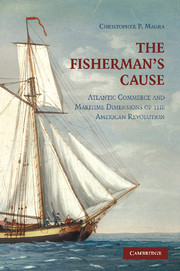Book contents
- Frontmatter
- Contents
- Acknowledgments
- Abbreviations
- Introduction
- Part One THE RISE OF THE COLONIAL COD FISHERIES
- Part Two ATLANTIC ORIGINS OF THE AMERICAN REVOLUTIONARY WAR
- Part Three THE MILITARY MOBILIZATION OF THE FISHING INDUSTRY
- 8 From Trade Routes to Supply Lines
- 9 The First American Navy
- 10 Starving the Enemy and Feeding the Troops
- 11 From Fishermen to Fighting Men
- Conclusion
- Index
- References
11 - From Fishermen to Fighting Men
Published online by Cambridge University Press: 03 July 2009
- Frontmatter
- Contents
- Acknowledgments
- Abbreviations
- Introduction
- Part One THE RISE OF THE COLONIAL COD FISHERIES
- Part Two ATLANTIC ORIGINS OF THE AMERICAN REVOLUTIONARY WAR
- Part Three THE MILITARY MOBILIZATION OF THE FISHING INDUSTRY
- 8 From Trade Routes to Supply Lines
- 9 The First American Navy
- 10 Starving the Enemy and Feeding the Troops
- 11 From Fishermen to Fighting Men
- Conclusion
- Index
- References
Summary
The greatest encouragement is given to seamen, which ought to be made known throughout Europe. Their pay in our Navy is eight dollars per month, with the best chance for prize money that men ever had, and liberty of discharges after every cruise, if they choose it.
Parliament's Restraining Act made commercial fishing on the Atlantic Ocean illegal for colonial fishermen such as skipper Joshua Burnham and the crew of the schooner Polly. The maritime laborers from Ipswich, Massachusetts, did not sit idle, however. They were able to find alternate means of employment. They enlisted with the Continental Navy shortly after Congress signed the Declaration of Independence. The navy offered jobs, wages, and the promise of prize shares, which held out hope to poorer fishing families. Three of the Polly's crew joined Burnham on December 7, 1776, in agreeing to “ship ourselves” and “Follow all the regulations of the American Congress & be under such regulations as is Customary for Seamen & Mariners.” These men were not the first, nor were they the last, to make the transition from commercial fishing to military service.
In addition to fish, fishing vessels, and overseas commercial connections, American fishermen were mobilized for war. The British government's efforts to control colonists' use of the sea disaffected laborers formerly employed in the chief engine of maritime commerce in New England. Fishermen then flooded the decks of America's fighting vessels and filled the ranks of the Continental Army.
- Type
- Chapter
- Information
- The Fisherman's CauseAtlantic Commerce and Maritime Dimensions of the American Revolution, pp. 215 - 232Publisher: Cambridge University PressPrint publication year: 2009



